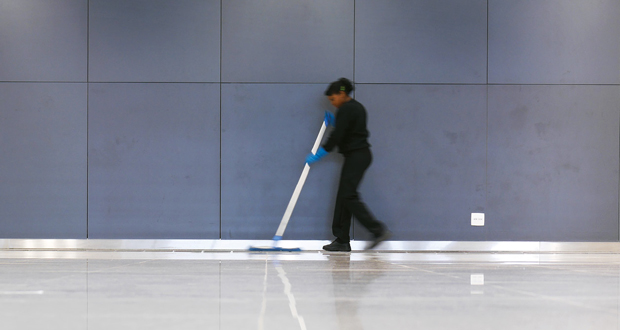 BRITISH CLEANING COUNCIL’S VIEW
BRITISH CLEANING COUNCIL’S VIEW
DELIA CANNINGS,
CHAIR, BCC
These latest reports are just two of a series which have highlighted these issues over the years. A TUC analysis just before the COVID-19 pandemic identified 3.6 million people in insecure work and in 2014 the Equality and Human Rights Commission identified a number of issues affecting ‘the invisible workforce’ including low rates of pay.
These working conditions can have a huge impact on staff wellbeing. They can make childcare arrangements or visiting a doctor difficult. Working hours being suddenly cut can cause financial problems. Unsociable hours can cause physical and mental health issues.
Minority ethnic, young and older workers are all disproportionately impacted by insecure work and it often comes hand in hand with low pay. As demonstrated by Birmingham City Council’s financial crisis, women are often left out of pocket too.
Staff in occupations like caring, hospitality, leisure and, unfortunately, the cleaning and hygiene sector are more likely to face these issues.
Rates of pay in the cleaning industry do not reflect the skill and knowledge of staff, with it incorrectly being viewed as low-skilled, with no opportunities for skill or career development.
Cleaning staff make up five per cent of the UK’s workforce but many do more than one job to make ends meet.
This isn’t new, it has historically always been the reality for many of those working in our industry.
Since the pandemic, staff have returned to the workplace with changed behaviours sometimes resulting in a negative impact on colleagues who must manage the situation. This often results in staff leaving a job they previously enjoyed because morale is low and job satisfaction diminishing.
So what can businesses do to help low paid staff in insecure work?
Firstly, they should commit to paying a real Living Wage to all their staff.
The British Cleaning Council has long called for firms in our sector to pay the Living Wage. Not only is it good for employees and their families, it is also good for businesses, bringing benefits such as improving morale and better staff retention.
The sector’s professional, highly-trained staff do a crucial, frontline role keeping people safe, well and healthy and they deserve to be paid accordingly.
The cleaning, hygiene and waste industry is worth £55bn, and pay rates should reflect this huge contribution to the economy.
The public increasingly expect high standards of hygiene following the pandemic, which is combining with severe staff shortages to put upwards pressure on wages.
The introduction of the Apprenticeship in Cleaning in Healthcare and the planned launch next year of the Cleaning Hygiene Operative Apprenticeship should help to dispel the low skill myth and assist in providing a career ladder.
Supporting in-work progression is another way companies can help. Investing in training and development can provide a potential route to better paid, more secure work.
Introducing a supportive flexible working culture should also be considered – allowing staff with family responsibilities, for example, to accept a new position which might have been impossible otherwise.
Offering a good employee benefits package with childcare, travel and retail options will also enable staff to make their money go further.





